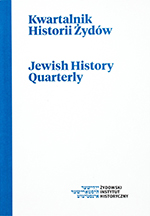The Community Which “Sat on the Suitcases” (Dzierżoniów)
The Community Which “Sat on the Suitcases” (Dzierżoniów)
Author(s): Bezalel LaviSubject(s): Cultural history, Social history, History of Judaism
Published by: Żydowski Instytut Historyczny
Keywords: Dzierżoniów; Jewish Provincial Committee; Jacob Egit; TSKŻ; anti-Semitism; emigration; Władysław Gomułka
Summary/Abstract: At the end of World War II tens of thousands of Jews who either survived in Poland or in the Soviet Union, traveled to Lower Silesia, the southern south part of the "regained territories" from Germany, and settled in Dzierżoniów (then Rychbach). Left intact by the war, it offered the basic conditions for opening a new life and from the beginning it was exceptional in being the only town in post-war Poland that was inhabited by a high percentage of Jews. In the town were founded the Jewish institutions which demonstrated the lives of those who returned from the hell: the Jewish Provincial Committee, which led a sort of a national self-autonomy - the daily social, economic, political and cultural lives of the newcomers. The first theatre in post-war Poland was organized in the town and performed across Lower Silesia and would be the precursor of the Central Jewish Theatre of the province. But the old rooted forces of anti-Semitism and the Communist Government policy cut short the possible realization of the early hopes and dreams. The very hard ordeal of the Kielce pogrom, in July 1946, resulted in the migration of thousands of Jews. The birth of the State of Israel, in May 1948, was the turning point in the history of the Jews in the post-war Poland, not just because of the realization of a long living dream, but because it was to affect directly their lives. Before long the Stalinist Soviet Union initiated an extreme anti-Jewish and anti-Israeli policy, which Poland had to follow, and signaled the end of the rather short-lived Jewish accomplishments.The central hallmark of the irreversible change was the dismantling of all Jewish organizations, parties and institutions and replacing them, at the end of 1950, by one central organization, Towarzystwo Społeczno-Kulturalne Żydów w Polsce (the Socio-Cultural Society of Jews in Poland'). Despite its official name, the real mission of the organization in the years to come was to represent the interests of the only party, the Communists, and ideologically oversee the Jewish population in order to strengthen its loyalty to the state. The other side of the turnover of the Jews life was the first sponsored and organized government decision to allow the Jews to leave the country. During the campaign that lasted for a year, between 1949 and 1950, thousands of Jews availed themselves of the opportunity and went away. Both this exodus and the elimination of the Jewish institutions, brought to an end a remarkable period the Jews in Dzierżoniów experienced. One historian stated that, "in the post-war history of the Jews in Poland, Dzierżoniów was a special place. Only that place earned the nickname 'Poland's Jerusalem'". It was the formal end of the institutional settlement in the town but not the end of the Jewish presence. Several thousand continued to manage a vivid life which represented their national identity, particular in the social and cultural spheres. Among them were those who were denied the emigration request, others who did not seek the option of going to the unknown and were those who believed in the communist utopia. When the Polish Government decided, in late 1956, to grant again the Jews the option to emigrate it turned out that the "sitting on the suitcases syndrome" was a very dominant factor in their lives. A great majority of the Jews grasped the opportunity and left behind almost everything to travel, mostly for Israel. The massive exodus of 1956-1957 brought virtually to an end the Jewish presence in Dzierżoniów after just a decade. A few hundred remained to face their fate a decade later, during the anti-Jewish campaigns in 1967-1968.
Journal: Kwartalnik Historii Żydów
- Issue Year: 262/2017
- Issue No: 02
- Page Range: 245-271
- Page Count: 27
- Language: Polish
- Content File-PDF

